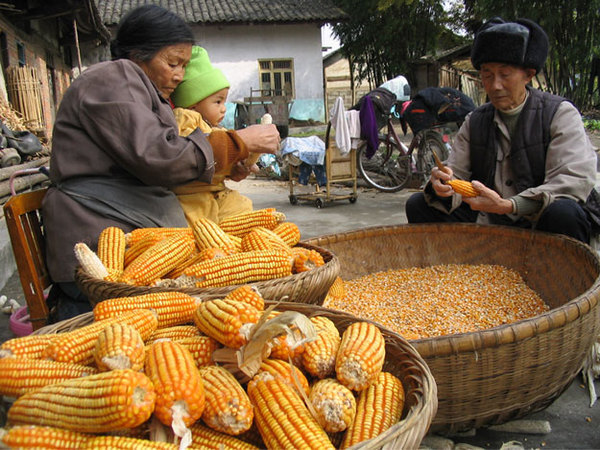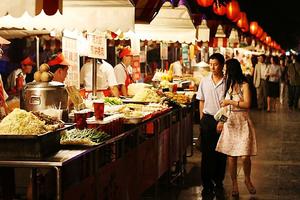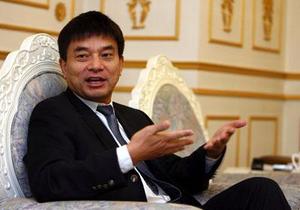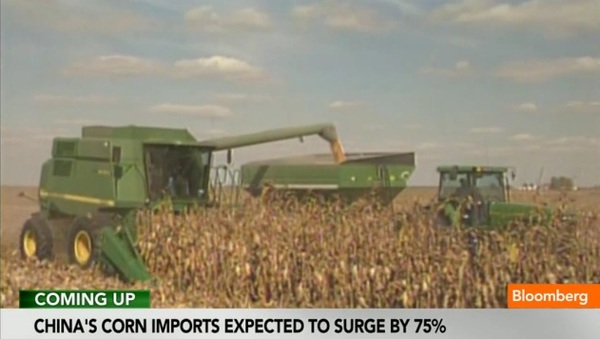Who will feed China?
http://www.grain.org/article/entries/4546-who-will-feed-china-agribusiness-or-its-own-farmers-decisions-in-beijing-echo-around-the-world
 (Photo: Reuters)
When
China began importing soybeans as animal feed in the late 1990s, it
ushered in one of the most dramatic agricultural transformations the
world has ever seen. On the other side of the world, 30 million hectares
of farms, forests, savannahs and pastures in the Southern Cone of Latin
America were converted to soy plantations to provide China’s new
factory farms with a cheap source of feed. And within China, low prices
paid to farmers and other policies favouring large agribusinesses pushed
millions of households out of meat production. Corporations and large
commercial farmers made fortunes, but rural communities, both in China
and the Southern Cone, paid the price (see Box 1, 2 & 4).
(Photo: Reuters)
When
China began importing soybeans as animal feed in the late 1990s, it
ushered in one of the most dramatic agricultural transformations the
world has ever seen. On the other side of the world, 30 million hectares
of farms, forests, savannahs and pastures in the Southern Cone of Latin
America were converted to soy plantations to provide China’s new
factory farms with a cheap source of feed. And within China, low prices
paid to farmers and other policies favouring large agribusinesses pushed
millions of households out of meat production. Corporations and large
commercial farmers made fortunes, but rural communities, both in China
and the Southern Cone, paid the price (see Box 1, 2 & 4).
 This
year China surpassed the US as the world's largest grocery market. If
the pace continues, Chinese consumers will spend US$1.6 trillion on
groceries in 2015. (Photo:
http://www.starfish-studio.com/2007/06/beijing-china.html)
This
year China surpassed the US as the world's largest grocery market. If
the pace continues, Chinese consumers will spend US$1.6 trillion on
groceries in 2015. (Photo:
http://www.starfish-studio.com/2007/06/beijing-china.html)
 "China
has 800 million farmers, of which 300-400 million are moving to cities.
That will increase the demand for agricultural products and decrease
the supply. This is positive for agricultural companies, like us," says
New Hope Group President Liu Yonghao, China’s fourth richest person and
Vice-Chairman of the Committee for Economic Affairs of the Chinese
People's Political Consultative Conference. Liu wants China to open its
maize market as it did with soybeans, by changing maize's classification
to a non-strategic crop for food security
"China
has 800 million farmers, of which 300-400 million are moving to cities.
That will increase the demand for agricultural products and decrease
the supply. This is positive for agricultural companies, like us," says
New Hope Group President Liu Yonghao, China’s fourth richest person and
Vice-Chairman of the Committee for Economic Affairs of the Chinese
People's Political Consultative Conference. Liu wants China to open its
maize market as it did with soybeans, by changing maize's classification
to a non-strategic crop for food security
 “I
see China’s increasing demand for corn as inexorable,” says David
Nelson of Rabobank, one of the biggest lenders to the farming industry
and an investor in global farmland (see "Marubeni bets on China with
Gavilon deal," Financial Times, 29 May 2012).
“I
see China’s increasing demand for corn as inexorable,” says David
Nelson of Rabobank, one of the biggest lenders to the farming industry
and an investor in global farmland (see "Marubeni bets on China with
Gavilon deal," Financial Times, 29 May 2012).
Who will feed China: Agribusiness or its own farmers? Decisions in Beijing echo around the world
GRAIN | 04 August 2012 | Against the grain (Photo: Reuters)
(Photo: Reuters)
Cheap meat for China’s growing urban population was supposed to be the
payoff. But in 2008, prices for pork spiked because of a massive disease
outbreak that swept through China’s pork industry, and now the country
is on the verge of a more serious round of food inflation as a drought
in the US causes global prices for soybeans to surge. On top of this,
China’s consumers have had to contend with numerous food safety scandals
and environmental disasters brought about by the shift to industrial
meat production.
 This
year China surpassed the US as the world's largest grocery market. If
the pace continues, Chinese consumers will spend US$1.6 trillion on
groceries in 2015. (Photo:
http://www.starfish-studio.com/2007/06/beijing-china.html)
This
year China surpassed the US as the world's largest grocery market. If
the pace continues, Chinese consumers will spend US$1.6 trillion on
groceries in 2015. (Photo:
http://www.starfish-studio.com/2007/06/beijing-china.html)
The problems generated at home and abroad by China’s growing dependence
on imports of feed crops will get much worse if China continues to open
its market to imports of maize, the other major crop used for
industrial feeds. In 2012, China will import a record five million
tonnes of maize, and it is on track to buy another seven million tonnes
in 2013. This is only around 5% of national maize consumption, but it is
still more maize than China imported during all previous 25 years
combined and it is already affecting global prices.[1]
China is now the world’s largest global food market. What Chinese
people eat has repercussions on everyone, because of the increasingly
global reach of how and where that food is produced. If the Chinese
government opens the country up to maize imports as it did with
soybeans, it could unleash another global agricultural transformation on
par with what occurred with soybeans. Recent developments show that
this is already starting to happen.
 "China
has 800 million farmers, of which 300-400 million are moving to cities.
That will increase the demand for agricultural products and decrease
the supply. This is positive for agricultural companies, like us," says
New Hope Group President Liu Yonghao, China’s fourth richest person and
Vice-Chairman of the Committee for Economic Affairs of the Chinese
People's Political Consultative Conference. Liu wants China to open its
maize market as it did with soybeans, by changing maize's classification
to a non-strategic crop for food security
"China
has 800 million farmers, of which 300-400 million are moving to cities.
That will increase the demand for agricultural products and decrease
the supply. This is positive for agricultural companies, like us," says
New Hope Group President Liu Yonghao, China’s fourth richest person and
Vice-Chairman of the Committee for Economic Affairs of the Chinese
People's Political Consultative Conference. Liu wants China to open its
maize market as it did with soybeans, by changing maize's classification
to a non-strategic crop for food security “I
see China’s increasing demand for corn as inexorable,” says David
Nelson of Rabobank, one of the biggest lenders to the farming industry
and an investor in global farmland (see "Marubeni bets on China with
Gavilon deal," Financial Times, 29 May 2012).
“I
see China’s increasing demand for corn as inexorable,” says David
Nelson of Rabobank, one of the biggest lenders to the farming industry
and an investor in global farmland (see "Marubeni bets on China with
Gavilon deal," Financial Times, 29 May 2012).Etiquetas: China, eng, Food Crisis, GRAIN

0 Comentarios:
Publicar un comentario
Suscribirse a Comentarios de la entrada [Atom]
<< Página Principal